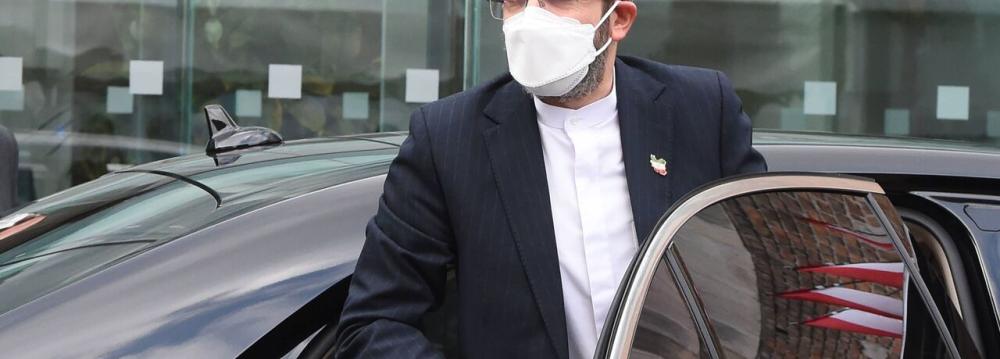Iran’s top negotiator in talks to revive the 2015 nuclear deal said Tehran would continue serious engagement to reach a good deal, adding his discussions over the past days have been “positive and moving forward.”
“Differences on the scope of negotiable issues are decreasing,” Ali Baqeri told IRNA.
Baqeri has been leading the new Iranian delegation in negotiations that started in April in the Austrian capital Vienna to work out how the United States and Iran can return to full compliance with the nuclear deal, known as the Joint Comprehensive Plan of Action.
Washington pulled out of the agreement in 2018 and reimposed sweeping sanctions that prompted Tehran to react by scaling down its commitments.
The Vienna talks made good progress over six rounds, but were paused in June due to a change of government in Iran.
A new Iranian negotiating team started the seventh round of negotiations in late November and presented two proposals which included reforms to previously agreed drafts.
The documents raised criticism by western sides who argued that Iran was backtracking on the diplomatic progress made.
Iran has not received any proposal and initiative from the other negotiating parties on areas of dispute, according to the top negotiator
Participants put the negotiations on hold so as to consult their capitals and resumed the process on Thursday.
Since then, multiple meetings have been held both at expert level and among chief negotiators to discuss Iran’s demands and proposals.
Besides the two expert working groups on US sanctions lifting and Iran’s nuclear measures, a third group also met for the first time this week to work on implementation and sequencing of the steps.
Serious Atmosphere
Baqeri told the IRIB news agency on Sunday that the general atmosphere was very serious and that he is optimistic that a final agreement would be reached.
He described his latest meeting with Russia and Chinese chief negotiators on Sunday as “constructive and fruitful”.
“We shared ideas about how to proceed & also coordinated our positions about several issues,” he tweeted.
Russia’s diplomat also said the negotiators managed to reconcile the new Iranian ideas.
“The work will continue on the basis of the previous drafts. The Iranian proposals will be properly considered and either incorporated or rejected or modified. Normal practice,” Mikhail Ulyanov said on Twitter.
Nevertheless, a host of differences still remain and a comprehensive agreement is yet to be reached, according to Baqeri.
“These differences are clearly visible in the final draft that was achieved following the sixth round of talks in Vienna… The differences, especially on the nuclear issue, are numerous and varied,” he told Press TV.
He added that Iran has informed the other parties of its views through the proposals, but has not received any initiative so far.
“When it comes to these points of difference, we have so far received no proposal and initiative from the opposite side,” he said.
Western negotiators have been less expressive over the past days.
Britain, however, warned during a meeting of the Group of Seven countries that time was running out for Iran to agree on a deal.
Foreign Secretary Liz Truss, from G7 host Britain, said the Vienna talks were Tehran’s “last chance to come to the negotiating table with a serious resolution,” AFP reported.
The US, who has been indirectly engaged in the talks, has also recently said it is making preparations for alternative solutions in case diplomacy fails with Iran in Vienna.


